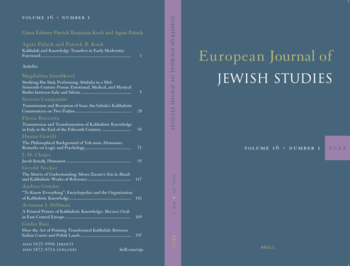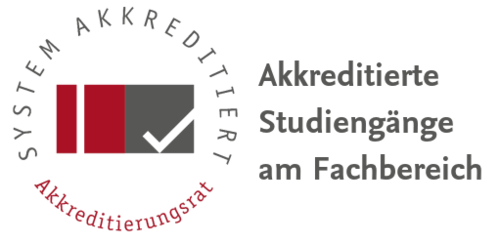"Kabbalah and Knowledge Transfers in Early Modernity", Special Issue of the European Journal of Jewish Studies Published!
News from Feb 18, 2022
We are pleased to announce the publication of “Kabbalah and Knowledge Transfers in Early Modernity,” a special issue of the European Journal of Jewish Studies 16.1 (2022).
Edited and with a foreword by Agata Paluch and Patrick Benjamin Koch and contributions by Magdaléna Jánošíková, Saverio Campanini, Flavia Buzzetta, Hanna Gentili, J. H. Chajes, Gerold Necker, Andrea Gondos, Avinoam J. Stillman, and Giulio Busi.
“Kabbalah and Knowledge Transfers in Early Modernity” interrogates the fashioning and evolution of the many forms of Kabbalah, understood as a literary, religious, and intellectual phenomenon in early modern Europe, from the perspective of the contemporary knowledge-making processes. The results of this collaborative effort follows three overlapping themes. First, it spotlights the material organization of kabbalistic knowledge and the role of media in the communication and dispersing of mystical and kabbalistic traditions. Secondly, it focuses on the literary organization of kabbalistic knowledge and its transmission in different genres and within variant epistemic contexts. Lastly, it zooms in on the movement of kabbalistic knowledges that were enabled by the circulation of people, texts, and objects across cultural, historical, and linguistic contexts. In looking at the transmission of kabbalistic knowledge, the articles in this issue highlight the often blurred boundaries between categories, taxonomies, or disciplines of knowing—including those referred to as “esoteric” and “mystical,” to which modern readers are often accustomed. They emphasize the shifts, often multiple, in meanings of kabbalistic ideas and practices contained in texts as they were translated, edited, and appropriated within new literary, linguistic, material, and cultural settings of early modern Europe.
Table of Contents:
Magdaléna Jánošíková
“Studying Ibn Sīnā, Performing Abulafia in a Mid-Sixteenth-Century Prison: Emotional, Medical, and Mystical Bodies between Italy and Silesia”
Saverio Campanini
“Transmission and Reception of Isaac ibn Sahula’s Kabbalistic Commentary on Two Psalms”
Flavia Buzzetta
“Transmission and Transformation of Kabbalistic Knowledge in Italy at the End of the Fifteenth Century”
Hanna Gentili
“The Philosophical Background of Yoḥanan Alemanno: Remarks on Logic and Psychology”
J. H. Chajes
“Jacob Ṣemaḥ, Humanist”
Gerold Necker
“The Matrix of Understanding: Moses Zacuto’s Em la-Binah and Kabbalistic Works of Reference”
Andrea Gondos
“‘To Know Everything’: Encyclopedias and the Organization of Kabbalistic Knowledge”
Avinoam J. Stillman
“A Printed Primer of Kabbalistic Knowledge: Sha‘arei Orah in East-Central Europe”
Giulio Busi
“How the Art of Printing Transformed Kabbalah: Between Italian Courts and Polish Lands”


